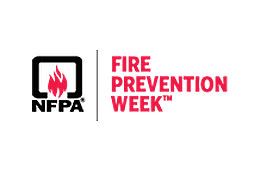- Home
- Your Government
- Departments
- Fire Department
- Fire Prevention
- Fire Prevention Week
Fire Prevention Week
 What is Fire Prevention Week?
What is Fire Prevention Week?
Fire Prevention week was established to commemorate the Great Chicago Fire, the tragic 1871 conflagration that killed more than 250 people, left 100,000 homeless, destroyed more than 17,400 structures and burned more than 2,000 acres. The fire began on October 8, but continued into and did most of its damage on October 9, 1871.
In 1920, President Woodrow Wilson issured the first National Fire Prevention Day Proclamation and since 1922, Fre Prevention Week has been observed on the Sunday through Saturday period in which October 9 falls. Fire prevention week is the longest running Public Health and Safety Observance on record. The President of the United States has signed a proclamation proclaimtion proclaiming a National Observance during that week every year since 1925.
Why do we have Fire Prevention Week?
To provide lifesaving public education in an effort to drastically decrease casualties caused by fires. During Fire Prevention Week, children, adults, and teachers learn how to stay safe in case of a fire. Firefighters provide lifesaving public education in an effort to drastically decrease casualties caused by fires.
Fire Prevention week is the perfect time to educate and talk with your whole family about fire safety – include testing alarms, changing the batteries or upgrading to 10-year sealed battery alarms, how to use a fire extinguisher and escape route planning.
- 3 of every 5 home fire deaths resulted from fires in homes with no working smoke alarms
- Less than 50% of homeowners have an escape plan
- Carbon monoxide (CO) is the #1 cause of accidental poisoning in the US
- 60% of consumers do not test their smoke and CO alarms monthly*
- Only 47% of people report having CO alarms in their home
- Just 43% of homeowners have an escape plan*
- Unattended cooking is the #1 cause of home fires